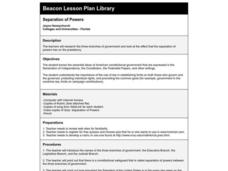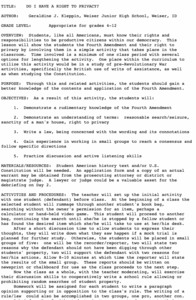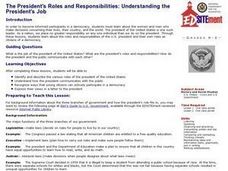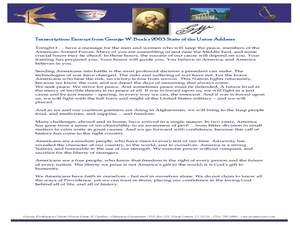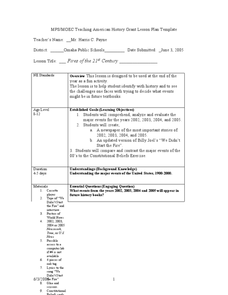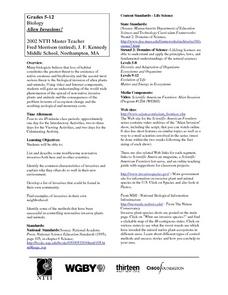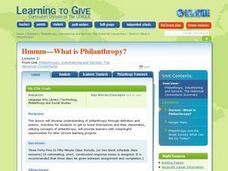Curated OER
Separation of Powers
Eighth graders research the three branches of government and examine the effect that the separation of powers has on the presidency. They explain the importance of the rule of law in establishing limits on both those who govern and the...
Curated OER
Expressive Linear Sculpture
Learners develop skill in utilizing line in a 3 dimensional context. They explore a variety of techniques for mounting sculptures to a base.
Curated OER
Growing a Citizen
Students analyze messages and values associated with civic engagement present in the media. They analyze the local community's promotion of values associated with civic engagement by conducting investigative research. They hypothesize...
Curated OER
Moot Court Preparation
Twelfth graders prepare themselves for a mock moot court. In groups, they are presented with an overview of each activity and research appellate cases related to the topic given to them. They identify regions of the country that have...
Curated OER
Moot Court
Learners research and discuss court cases in preparation for Moot Court. Student attorneys research precedents involving their cases, while student justices research political ideology of Supreme Court Justices. Student attorneys then...
Curated OER
Civil Action
Learners will observe the legal procedures involved in class action lawsuits and gain knowledge of how they are sometimes used as a tool to deter polluters of the environment. Students will also read about the background the Love Canal...
Curated OER
The Embodied Presidency
Tenth graders analyze Roosevelt's Fireside Chats. In this Franklin D. Roosevelt presidency, 10th graders determine how well FDR's government programs aided victims of the Great Depression. Students examine selected Fireside Chats and...
Curated OER
Do I Have a Right To Privacy?
Students, in groups, explore the Fourth Amendment and their right to privacy. They explore reasonable search/seizure, sanctity of a man's house, right to privacy.
Curated OER
The President's Roles and Responsibilities: Understanding the President's Job
Students examine the roles and responsibilites of the president of the U.S. They identify and discuss the three branches of U.S. government, view and discuss a White House Photo essay online, and create a class book entitled, 'If I Were...
NYC Department of Records
Citizenship and Elections: The Importance of a Ballot
Approximately 58 prcent of those eligible voted in the 2016 US Presidential election. In an attempt to impress upon learners the importance of voting and voting rights, class members examine primary source documents related to the...
Curated OER
Does My Hair Disrupt Your Learning
Students research the laws and policies for school dress codes. They interview school employees to find out opinions of the policies. This they compare the findings with student interviews that are conducted.
Curated OER
Tinker v. Des Moines (1969)
Students explore the concept of symbolic speech. In this case study lesson, students read excerpts of Tinker v. Des Moines. Students then complete the provided worksheet activities and determine whether they agree with the outcome of the...
Curated OER
The New Republic
Students research the Federalists and Anti-federalists. In the lesson on state legislature, students use primary sources to create a brochure and write an essay that illustrates federalist and anti-federalists viewpoints.
Curated OER
Affects of Prejudicial Attitudes
Second graders explore the concept of cultural assimilation. They study the affects of prejudice on the authors of Curious George (Margret & H. A. Rey). They communicate ideas and opinions of the rights and responsibilities of...
Curated OER
Founding Myths, Stories that Hide Our Patriotic Past
Learners participate in a scavenger hunt using their textbooks to find information about historical events, people and places in US history during the Revolutionary Era. After creating their list of important people, students create...
Curated OER
George Washington's Foreign Policy
Learners compare George Washington's foreign policy to the policies of presidents who followed him. In this primary source analysis lesson, students compare Washington's Farewell Address to the Roosevelt Corollary, the Monroe Doctrine,...
Curated OER
Celebrate Hispanic Heritage Month!
Students use information from the U.S. Bureau of the Census to create a bar graph, a picture graph, or a circle graph showing the country of origin of U.S. Hispanics.
Curated OER
Fires of the 21st Century
Students explore historical perspectives. In this contemporary history lesson, students listen to Billy Joel's "We Didn't Start the Fire," discuss they lyrics, and add a new verse to the song for the years 2002, 2003, 2004, and 2005.
Curated OER
The Declaration of Independence
Students examine the Declaration of Independence. In this colonial America lesson, students read literature regarding the document as well as excerpts of the document itself. Students also perform a Reader's Theatre script based on the...
Curated OER
Alien Invasions!
Students use video and Internet components, to gain an understanding of non-native invasive plants and animals and the ecological and monetary problems they cause.
Stanford University
The 1898 North Carolina Election
Pupils discuss why the Democrats defeated the Fusion ticket in the 1898 North Carolina election. In this content area reading instructional activity, learners explore three primary documents and answer guiding questions that help them...
Curated OER
Hmmm-What is Philanthropy?
Students develop an understanding of philanthropy through definition and actions. Students to get to know themselves and their classmates by engaging in activities imbedded in this lesson. They investigate the types of philanthropic...
Curated OER
Women in Progressive Era
Learners study the Progressive Era. They identify the important people, places, and evens of the Era and determine how women influenced the progressive movement. In addition, they create an article to address issues related to the movement.
Curated OER
Federalist and Antifederalist Papers
Students debate the Federalist and Anti-federal Papers after using the Internet as a research tool.


